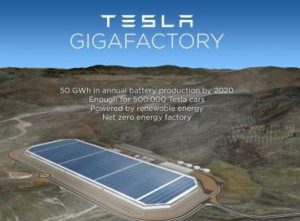Alliance now largest automaker: The Renault-Nissan-Mitsubishi Alliance bumped Volkswagen Group out of the top spot as the world’s largest seller of light-duty vehicles 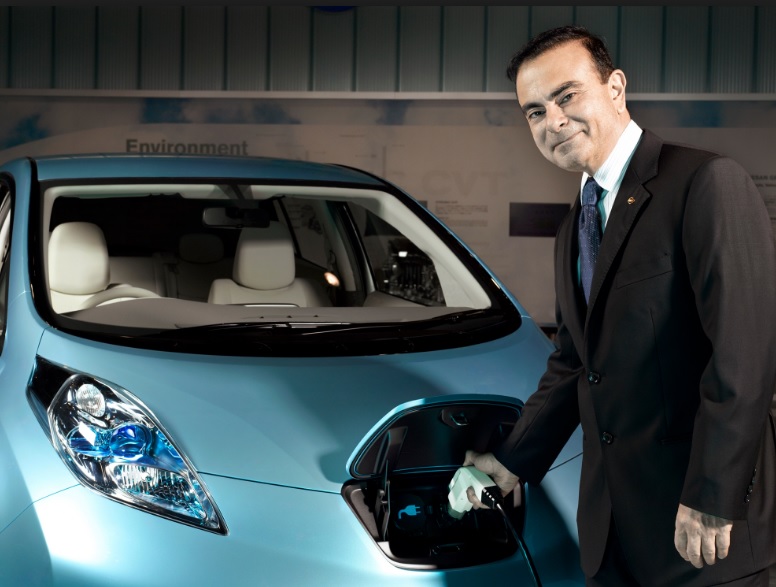 during 2017. That was made up of 10.61 million new vehicles sold last year with Nissan bringing in 5.82 million, Renault 3.76 million, and its Mitsubishi subsidiary (acquired in 2016) selling 1.03 million. VW came in at 10.53 million and longtime winner Toyota Motor sold 10.2 million. CEO Carlos Ghosn has pledged to tap into economies of scale and double savings by 10 billion euros ($12 billion) by 2022. That assumes annual sales will rise to 14 million vehicles. Sharing parts and consolidating platforms is the foundation it’s being built on, as it usually cuts r&d and manufacturing costs. The Alliance will be rolling out 12 new all-electric models using common platforms by 2022, Ghosn said late last year. Plug-in hybrid models will also be utilized, coming from Mitsubishi’s experience with the Outlander PHEV. Two other utility plug-in hybrids will be coming to market over the next two years. The alliance companies have collectively already sold more than a half million plug-in electrified vehicles.
during 2017. That was made up of 10.61 million new vehicles sold last year with Nissan bringing in 5.82 million, Renault 3.76 million, and its Mitsubishi subsidiary (acquired in 2016) selling 1.03 million. VW came in at 10.53 million and longtime winner Toyota Motor sold 10.2 million. CEO Carlos Ghosn has pledged to tap into economies of scale and double savings by 10 billion euros ($12 billion) by 2022. That assumes annual sales will rise to 14 million vehicles. Sharing parts and consolidating platforms is the foundation it’s being built on, as it usually cuts r&d and manufacturing costs. The Alliance will be rolling out 12 new all-electric models using common platforms by 2022, Ghosn said late last year. Plug-in hybrid models will also be utilized, coming from Mitsubishi’s experience with the Outlander PHEV. Two other utility plug-in hybrids will be coming to market over the next two years. The alliance companies have collectively already sold more than a half million plug-in electrified vehicles.
Uber supporting anti-trafficking groups: Uber’s new CEO Dara Khosrowshahi is looking for ways to pull the ride-hailing giant out of the quagmire, this time encouraging drivers to be aware of human trafficking that may be transported in their vehicles. When drivers log into the app, they’re instructed on how to spot victims of trafficking and best ways to report it to police and anti-trafficking support groups. One of these, Polaris, is Uber’s partner in the campaign. Human trafficking has become of major concern to non-profit groups and government agencies around the world, including the U.S. Khosrowshahi has been working at improving relations with Uber drivers and the public. Drivers can now receive tips, which was always an edge Lyft had over Uber; they can also call a hotline when they have questions.
Veloz launches EV awareness campaign: Veloz, a new California-based nonprofit organization supporting the electric car movement, has hired Division of Labor, an advertising agency headquartered in Sausalito, Calif. The two are working together to develop, test, and provide a strategic plan for a brand-inclusive outreach campaign that will inspire Californians to drive electric. Veloz is taking an approach emphasizing the fun, emotional, and significant benefits EV drivers will experience by driving electric. Made up of industry experts to bring public and private sectors together supporting EV adoption, the group thinks that sales will only go up substantially if consumers know about good purchase choices they can make. A strategic planning phase will continue through May, followed in the summer by implementation of the campaign. As with other initiatives in California, a portion of the campaign budget will go to reaching multi-cultural populations, low-income, and disadvantaged communities.
VW fires chief lobbyist as scandal continues: Volkswagen fired its chief lobbyist, 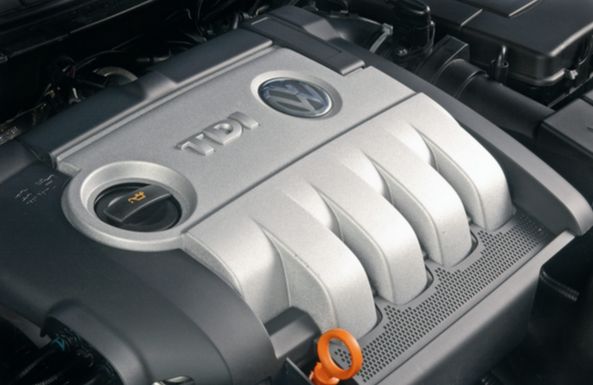 Thomas Steg, today in response to reports that the company and two competitors had sponsored tests that exposed monkeys and humans to toxic diesel fumes. The company had come under scrutiny again last week after The New York Times reported that VW, BMW, and Daimler had funded an organization called European Research Group on Environment and Health in the Transport Sector (EUGT) to carry out the tests. These methods used in the U.S. were wrong, unethical, and repulsive, VW CEO Matthias Mueller said Monday. The study had been conducted in 2014 to defend diesel following reports that diesel car fumes were carcinogenic. The EUGT study had been dissolved last year. This news was revealed right after Germany’s KBA automotive watchdog has detected illicit emission-control software in Audi’s latest Euro-6 diesel models. KBA has ordered a recall of these 127,000 vehicles, putting more pressure on parent company VW to comply with government mandates in the U.S. and Europe.
Thomas Steg, today in response to reports that the company and two competitors had sponsored tests that exposed monkeys and humans to toxic diesel fumes. The company had come under scrutiny again last week after The New York Times reported that VW, BMW, and Daimler had funded an organization called European Research Group on Environment and Health in the Transport Sector (EUGT) to carry out the tests. These methods used in the U.S. were wrong, unethical, and repulsive, VW CEO Matthias Mueller said Monday. The study had been conducted in 2014 to defend diesel following reports that diesel car fumes were carcinogenic. The EUGT study had been dissolved last year. This news was revealed right after Germany’s KBA automotive watchdog has detected illicit emission-control software in Audi’s latest Euro-6 diesel models. KBA has ordered a recall of these 127,000 vehicles, putting more pressure on parent company VW to comply with government mandates in the U.S. and Europe.

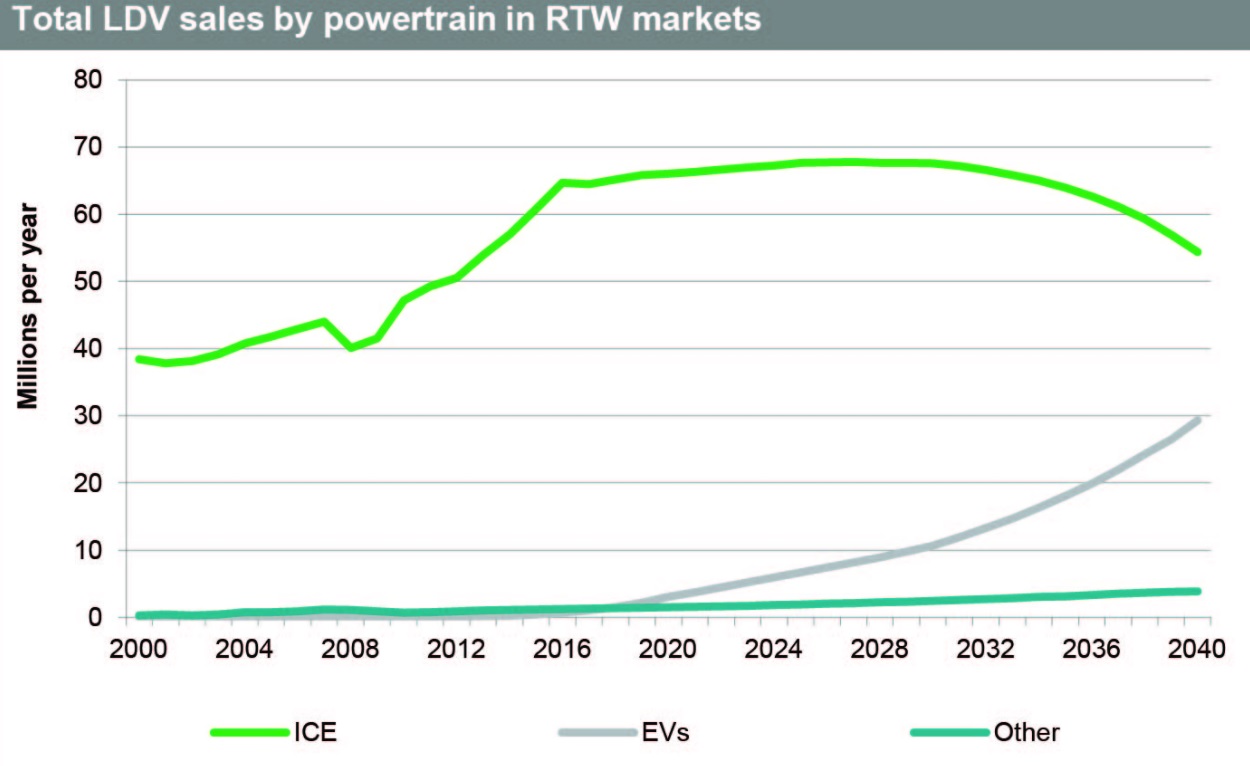 markets by 2040 – China, the U.S., Europe, and India – according to a new study by IHS Markit. You’ll notice that the percentage isn’t anywhere near 100% if fossil-fuel bans were to be enacted across these four markets. China, India, France, Great Britain, and other markets are considering banning gasoline and diesel powered engines entirely.
markets by 2040 – China, the U.S., Europe, and India – according to a new study by IHS Markit. You’ll notice that the percentage isn’t anywhere near 100% if fossil-fuel bans were to be enacted across these four markets. China, India, France, Great Britain, and other markets are considering banning gasoline and diesel powered engines entirely. kWh battery and an 80-kilowatt electric motor. The Japanese automaker promised to release a faster, more powerful version with longer range in 2019. The new Leaf is not meeting the 200-mile electric vehicle standard that’s becoming the norm, but it is going about 40 miles further than the current Leaf and costs a bit less; and it can deliver 147 horsepower, 38% more than the previous version. It’s got a new sharp-edged aerodynamic look and a few tech features. That includes the ProPILOT advanced driver assistance system, ProPILOT Park, and the e-Pedal that allows for accelerating, decelerating and stopping the car by using the accelerator pedal alone.
kWh battery and an 80-kilowatt electric motor. The Japanese automaker promised to release a faster, more powerful version with longer range in 2019. The new Leaf is not meeting the 200-mile electric vehicle standard that’s becoming the norm, but it is going about 40 miles further than the current Leaf and costs a bit less; and it can deliver 147 horsepower, 38% more than the previous version. It’s got a new sharp-edged aerodynamic look and a few tech features. That includes the ProPILOT advanced driver assistance system, ProPILOT Park, and the e-Pedal that allows for accelerating, decelerating and stopping the car by using the accelerator pedal alone.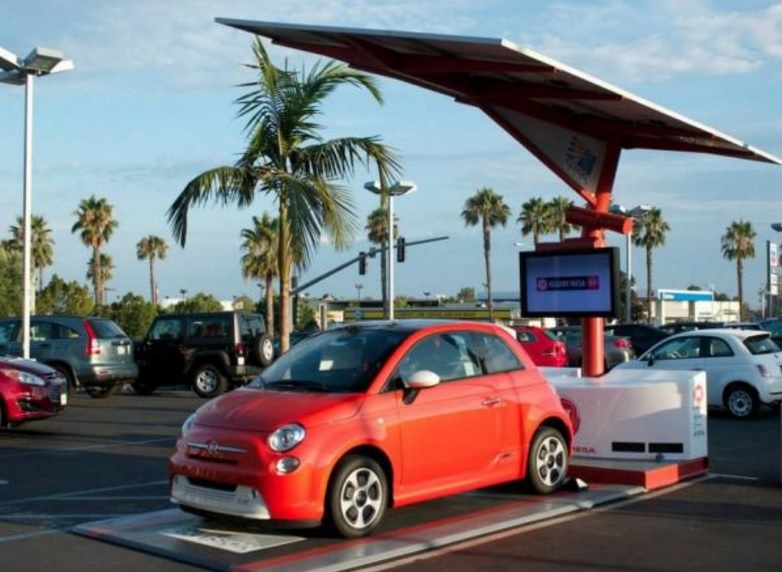 conduct studies on the best ways to write and implement EV rebate legislation. The report won’t be due until Sept. 1, 2019. Language was also removed from AB 1184 that offered a formula for providing higher rebate amounts. The full legislature will consider the amended bill. The $3 billion originally in AB 1184 would have offered rebates until 2030. It would have been six times higher than the nearly $500 million spent on EV rebates so far in the state.
conduct studies on the best ways to write and implement EV rebate legislation. The report won’t be due until Sept. 1, 2019. Language was also removed from AB 1184 that offered a formula for providing higher rebate amounts. The full legislature will consider the amended bill. The $3 billion originally in AB 1184 would have offered rebates until 2030. It would have been six times higher than the nearly $500 million spent on EV rebates so far in the state.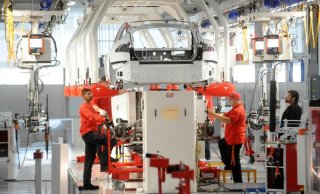 Workers union with charges of unfair labor practices. The Fremont factory has been picking up production volume as the Tesla Model 3 is being delivered to first buyers, and with production volumes speeding up later this year. Tesla sees it as a campaign by UAW to unionize Tesla workers, which has failed to gain enough support so far to win a union election. Employees have voiced their own concerns about working conditions in the factory. A study released by Worksafe in May found injuries at the Fremont plant to be much higher than the industry average in recent years.
Workers union with charges of unfair labor practices. The Fremont factory has been picking up production volume as the Tesla Model 3 is being delivered to first buyers, and with production volumes speeding up later this year. Tesla sees it as a campaign by UAW to unionize Tesla workers, which has failed to gain enough support so far to win a union election. Employees have voiced their own concerns about working conditions in the factory. A study released by Worksafe in May found injuries at the Fremont plant to be much higher than the industry average in recent years.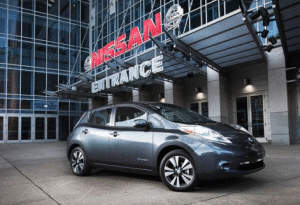 well lately, with an 8.3% increase over July. At 9,685 units sold in the U.S. so far in 2017, it’s up 22.3% over that same period last year. There’s been a lot of interest in the Leaf lately with the all-new version being launched in September. It will be longer range than the current Leaf and will feature a new set of tech features, including ePedal. Consumers are looking for more affordable electric cars and have a lot of interest in the new Leaf, along with the Tesla Model 3 and Chevy Bolt.
well lately, with an 8.3% increase over July. At 9,685 units sold in the U.S. so far in 2017, it’s up 22.3% over that same period last year. There’s been a lot of interest in the Leaf lately with the all-new version being launched in September. It will be longer range than the current Leaf and will feature a new set of tech features, including ePedal. Consumers are looking for more affordable electric cars and have a lot of interest in the new Leaf, along with the Tesla Model 3 and Chevy Bolt.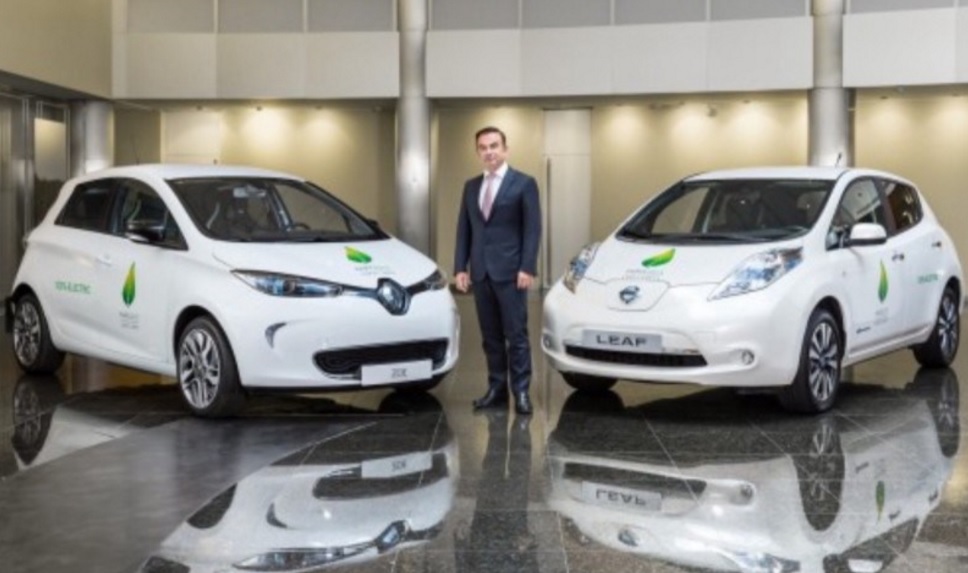 by 2019 through eGT New Energy Automotive Co., Ltd., the new company. The three companies have been in alliance for years with a shared factory already in place. It will tie into CEO Carlos Ghohn strategy to maximize economies of scale and become more EV competitive, along with Donfeng’s mission to bring “light, electric, intelligent, interconnected and shared” vehicles to the new energy vehicle market. China is in the process of becoming stricter on subsidies and watching out for another cheating scandal. The government is expected to soon announce a zero emission vehicle mandate similar to California’s. Whatever the government requires, automakers are not backing off China’s booming EV market.
by 2019 through eGT New Energy Automotive Co., Ltd., the new company. The three companies have been in alliance for years with a shared factory already in place. It will tie into CEO Carlos Ghohn strategy to maximize economies of scale and become more EV competitive, along with Donfeng’s mission to bring “light, electric, intelligent, interconnected and shared” vehicles to the new energy vehicle market. China is in the process of becoming stricter on subsidies and watching out for another cheating scandal. The government is expected to soon announce a zero emission vehicle mandate similar to California’s. Whatever the government requires, automakers are not backing off China’s booming EV market.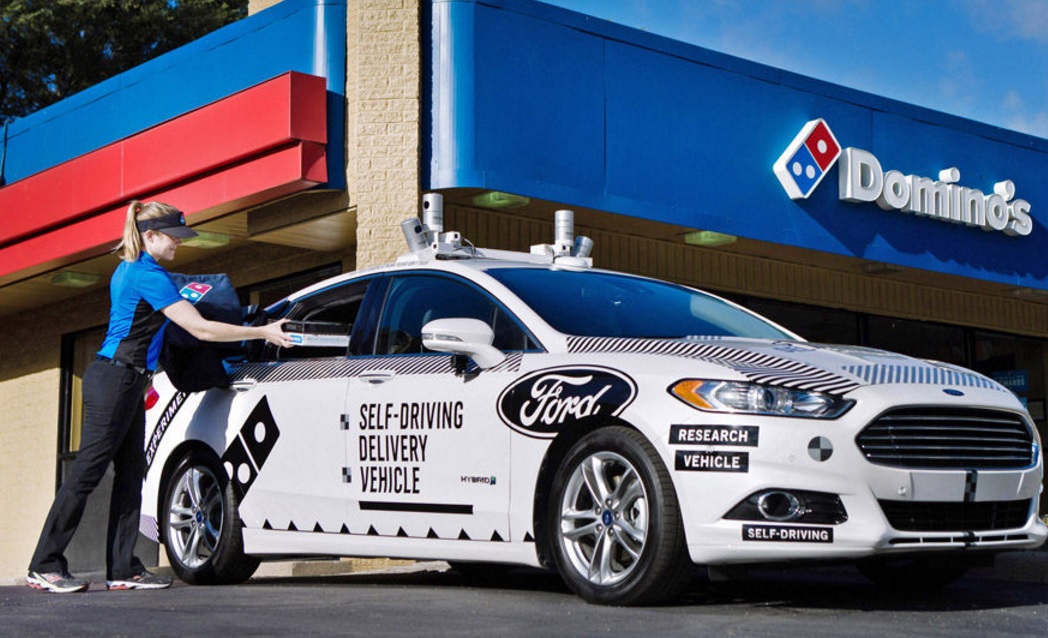 a pizza through a self-driving vehicle. Over the next few weeks, customers in Ann Arbor, Mich., will have the opportunity to receive their order from a Ford Fusion Hybrid Autonomous Research Vehicle. It will be manually-driven by a Ford safety engineer and staffed with researchers. Ford plans to begin producing self-driving vehicles in 2021 and will tap into the data from this test project.
a pizza through a self-driving vehicle. Over the next few weeks, customers in Ann Arbor, Mich., will have the opportunity to receive their order from a Ford Fusion Hybrid Autonomous Research Vehicle. It will be manually-driven by a Ford safety engineer and staffed with researchers. Ford plans to begin producing self-driving vehicles in 2021 and will tap into the data from this test project. vision that will give the driver a better sense of what’s going on around the electric car. That could tie well into the Pro Pilot Assist features announced earlier. There’s also the e-Pedal, allowing the driver to do everything from one pedal. The Leaf will be coming out first in the U.S. on Sept. 5 with the world launch taking place in Japan the next day.
vision that will give the driver a better sense of what’s going on around the electric car. That could tie well into the Pro Pilot Assist features announced earlier. There’s also the e-Pedal, allowing the driver to do everything from one pedal. The Leaf will be coming out first in the U.S. on Sept. 5 with the world launch taking place in Japan the next day.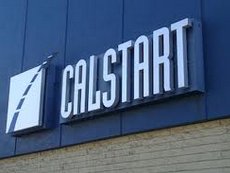 Speakers include: Mary Nichols, Chair, California Air Resources Board; Diarmuid O’Connell, Vice President, Business Development, Tesla; Caroline Choi, Senior Vice President of Regulatory Affairs, Southern California Edison; and Scott Phillippi, Senior Director of Maintenance & Engineering, International Operations, UPS. The hotel block is filling up, so it would be
Speakers include: Mary Nichols, Chair, California Air Resources Board; Diarmuid O’Connell, Vice President, Business Development, Tesla; Caroline Choi, Senior Vice President of Regulatory Affairs, Southern California Edison; and Scott Phillippi, Senior Director of Maintenance & Engineering, International Operations, UPS. The hotel block is filling up, so it would be  test drive. Nissan is the official sponsor of the event for the third straight year. “The timing couldn’t be better. Bringing LEAF to some of the most enthusiastic EV advocates just days after its global debut is the perfect way to kick things off for this technology-packed car,” said Brian Maragno, director, Nissan EV Marketing and Sales Strategy.
test drive. Nissan is the official sponsor of the event for the third straight year. “The timing couldn’t be better. Bringing LEAF to some of the most enthusiastic EV advocates just days after its global debut is the perfect way to kick things off for this technology-packed car,” said Brian Maragno, director, Nissan EV Marketing and Sales Strategy.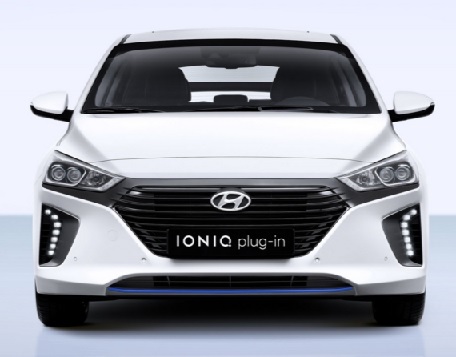 which has gone up to 31 eco-friendly vehicles coming out by 2020, up from the previous goal of 28. The company announced today that one of its new EVs will go 500 kilometers (311 miles) per charge when it comes out after 2021. A small electric SUV will have a driving range of 390 km (about 242 miles) will come out during the first half of next year. The company also announced that it will be launching a hydrogen fuel cell vehicle that can travel more than 580 kilometers (360 miles) after being fueled. The second-generation fuel cell SUV will be coming out early next year. Hyundai said it be going 40% farther than its first-generation fuel cell vehicle, the Tucson ix FCEV. So far, the green car campaign has been led by the Ioniq hybrid, all-electric, and upcoming plug-in hybrid version.
which has gone up to 31 eco-friendly vehicles coming out by 2020, up from the previous goal of 28. The company announced today that one of its new EVs will go 500 kilometers (311 miles) per charge when it comes out after 2021. A small electric SUV will have a driving range of 390 km (about 242 miles) will come out during the first half of next year. The company also announced that it will be launching a hydrogen fuel cell vehicle that can travel more than 580 kilometers (360 miles) after being fueled. The second-generation fuel cell SUV will be coming out early next year. Hyundai said it be going 40% farther than its first-generation fuel cell vehicle, the Tucson ix FCEV. So far, the green car campaign has been led by the Ioniq hybrid, all-electric, and upcoming plug-in hybrid version.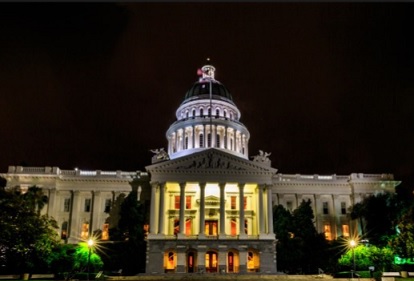 through when eight Republicans broke ranks and joined with Democrats to continue the program that came from AB 32; it requires companies to buy permits to release greenhouse gases into the atmosphere. Gov. Jerry Brown has been committed to adding the bullet train from Los Angeles to San Francisco, and bringing more electric vehicles and infrastructure to the state. Sources say there’s already more than $200 million available through the cap-and-trade auctions, now in their fifth year, that can go toward alternative fuels and infrastructure in the state.
through when eight Republicans broke ranks and joined with Democrats to continue the program that came from AB 32; it requires companies to buy permits to release greenhouse gases into the atmosphere. Gov. Jerry Brown has been committed to adding the bullet train from Los Angeles to San Francisco, and bringing more electric vehicles and infrastructure to the state. Sources say there’s already more than $200 million available through the cap-and-trade auctions, now in their fifth year, that can go toward alternative fuels and infrastructure in the state.